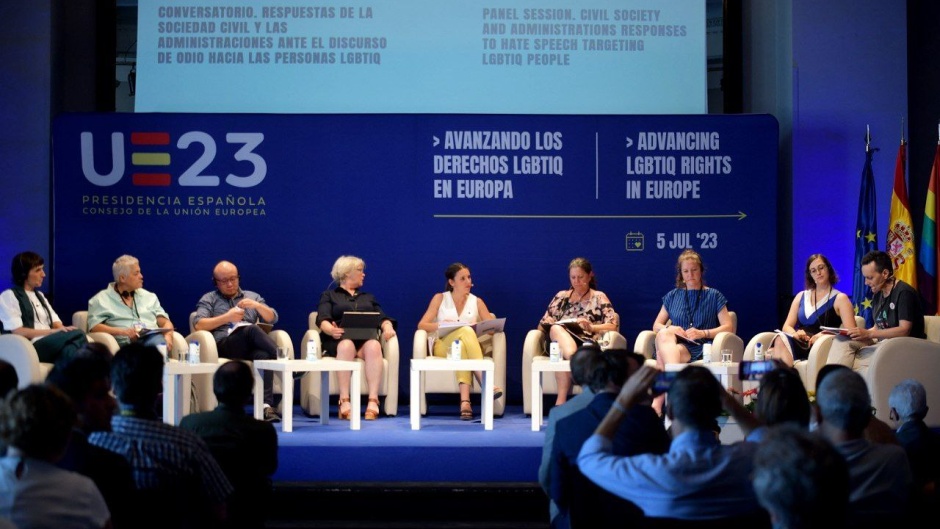16 European countries sign agreement to promote transgender policies
Only two weeks before the general elections, the Spanish government uses the European Union Presidency to promote gender self-identification across the continent.
MADRID · 06 JULY 2023 · 14:59 CET

16 countries of the European Union have signed a declaration to further promote transgender policies in Europe.
In Madrid, ministers and LGBT groups met on 5 July for “Advancing LGBTQI+ Rights in Europe”, an European Union event to further “develop the European Commission's Strategy for LGBTQI+ Equality 2020–2025”, a plan Evangelical Focus reported about two years ago.
France, Germany, Sweden, Denmark, Finland, Belgium, the Netherlands, Portugal, Ireland, Slovenia, Estonia, Lithuania, Luxembourg, Malta and Cyprus were the countries officially represented in the Spanish capital.
A controversial Spanish Minister of Equality
This initiative is among the first of the Spanish government to start its Presidency of the Council European Union (a rotatory role given to EU countries every 6 months). It has been led by Irene Montero, the Spanish Minister for Equality, a leader of the leftist party Podemos, the coalition partner of the Social Democrats PSOE.
Spain gets ready to celebrate a general election on 23 JuIy, in a context in which all surveys foresee a defeat of the leftist coalition in government.
Montero, who has been heavily criticised by feminists, legal experts, medical doctors and parents for promoting the known as Trans Law in 2022 (which allows teenagers to change one’s legal gender), has been praised by LGBTQI groups in Europe for its defence of the transgender agenda.
It is known that Montero will not be a member of the government that comes out of the parliamentary elections in two weeks. Even if Prime Minister Pedro Sánchez had chances of forming a new government, the now Equality Minister would not continue in the post as her position in the new Sumar leftist coalition lists is not high enough to aspire to win a seat in the national parliament.
Perhaps because of this reason, Minister Montero scheduled this EU gathering on the LGBTQI+ agenda before the election, only 5 days after the beginning of Spain’s Presidency of the EU.
Hoy hemos celebrado un conversatorio internacional entre la sociedad civil y las instituciones para poner en común el compromiso de todas, todos y todes para hacer frente a la LGTBIfobia y avanzar en políticas que defiendan los derechos LGTBI en España y en toda la Unión Europea. pic.twitter.com/Qg0DrbS7g7— Irene Montero (@IreneMontero) July 5, 2023
What the document does say
The document signed by the 16 countries in Madrid calls for the recognition across the European Union of gender self-determination for transgender people, legal sex change without special requirements, and the ban of so-called ‘conversion therapies’.
Speaking at the event, Montero spoke of “a clear direction” in which Europe “guarantees LGTBI rights to protect the heart of our democracies”. The European Union should “proudly advances the rights of LGTBI people and thus puts a stop to hatred and LGTBIphobia”.
The document to which these 16 countries committed speaks of “increased hatred, violence and discrimination” towards LGBTQI people in Europe, “and, in particular, towards transgender people”. It also denounces that “some political and civil society organisations are campaigning to repeal existing legislation” and to “prevent the right to legal gender recognition without inhuman or degrading requirements”.
There is a need for EU countries to be monitored, states the agreement, and for legal action to be taken when EU legislation on such LGBTQI rights is not adequately implemented.
A heated ‘trans’ debate in Spain
Irene Montero’s Podemos party suffered a strong defeat in the regional elections of May. Prime Minister Pedro Sánchez's party PSOE also saw a loss of regional governments, which led him to announce a 'snap' general election in July.
If the candidate of the main opposition conservative party (the People’s Party), Alberto Núñez Feijóo, won the election, Spain’s Presidency of the European Union would have a major change in its leadership after the summer. Feijóo has repeatedly said that a government led by him would change the Trans Law, which alongside the Scottish self-identification law is considered one of the most controversial in Europe.
In Spain, a large part of feminist organisations have decried what they consider policies that “erase women” in the social sphere. The hashtag #FeminismoNoVotaTraidores (Feminism does not vote traitors) has been trending several times in the last months.
Evangelical Christians have also been vocal in their demand to respect the spaces and identity of women and children.
Published in: Evangelical Focus - europe - 16 European countries sign agreement to promote transgender policies
Since you are here…
Evangelical Focus is a news and opinion platform that brings together Christians from across Europe and other parts of the world. We need the support of our readers to make this media project sustainable in the long term. You can support our work! Read about Evangelical Focus’s sustainability here.
Would you like to support the work of Evangelical Focus?
Use one of these methods. You can also transfer your donation to “Areópago Protestante / Evangelical Focus” IBAN: ES8521000853530200278394 (Swift / BIC: CAIXESBBXXX). Subject: “Donation Evangelical Focus”
